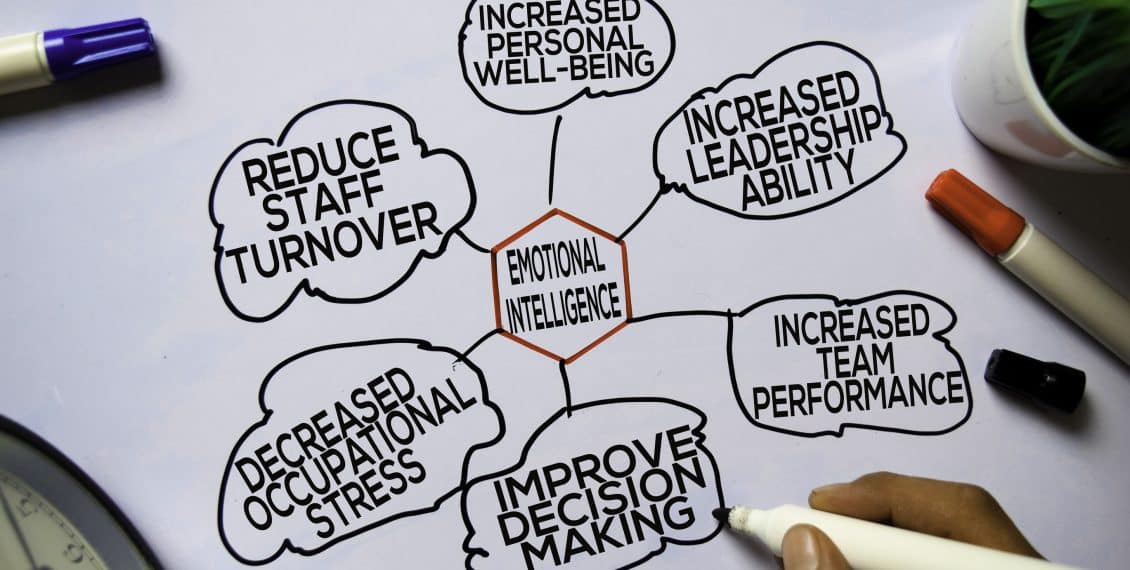Even if every individual on your team has a high EQ, or strong emotional intelligence skills, that doesn’t automatically translate into a high EQ for the team as a whole. In order for a team to have an effective EQ, each individual needs to be doing their part to build trust, which includes developing a strong sense of group identity.
As the overall team EQ grows, so does the team’s ability to address challenges head-on, becoming more successful in terms of performance, even as environments and situations become more complex.
To get started, it’s a good idea to evaluate the individual EQ of each member of your team. By knowing where your team’s strengths are, and identifying them with certain individuals, it becomes more clear where the work needs to happen — and how everyone can help do their part.
Once these individual strengths and opportunities have been identified, you can start using the four ideas below in order to improve your team’s overall performance.
4 Effective Ways to Improve Your Team’s EQ
Identify a Leader with Strong EQ
While everyone on the team is equally important, it’s important to have a leader with strong EQ. Just as professional sports teams elect a captain who can lead by example, your team should also find the person who has the best ability to be self-aware.
This self-awareness is important for your team’s leader because it drives other EQ factors, such as emotional management and strong communication. The more self-aware your leader is, the more socially aware they’re likely to be too, which means they can realize what’s happening within the team and then provide useful feedback to keep everyone going in the right direction.
This team leader should also be emotionally intelligent in terms of conflict resolution so that your team doesn’t get sidetracked when issues arise. The leader who has these skills will be able to earn the respect they need from their team in order continue in a leadership role.
Give Everyone on Your Team a Voice
Everyone on your team needs to be heard in order for a strong team EQ to be developed.
This means that focusing on communication is an essential part of creating a high-performing team. Each individual needs to understand, then, what active listening is — as well as commit to practicing it daily. In addition to verbal communication, the better your team is able to read an understand body language, the better they’ll be able to work together.
When team members begin to get frustrated, they need to know there’s an opportunity for them to be heard, both by the team leader and the team as a whole. When everyone is able to voice their concerns and share their ideas, you’ll know you’re on your way to creating a strong team EQ.
Ignite Individual Passions
A team with a high EQ is also a passionate team. Everyone on the team needs to have bought in to the company culture and the project goals. And, because passion has its highs and lows, every member of the team needs to know how to ignite their passion in order to prevent “team lows” from occurring.
Some of the most effective ways to reignite passion include taking the time to recognize the hard work and accomplishments of the team, as well as keeping the company mission at top of mind. Doing both of these will help keep motivation levels — and overall sense of purpose — high.
Manage Stress Creatively
Stress happens, and it will on your team. Finding creative ways to address stress, however, can mitigate its negative effects. In order to help your team avoid burning out from too much stress, do your best to build healthy time management habits — and discourage multi-tasking across the board.
A lot of times, things like redundant emails or non-essential meetings become the tipping point for stress levels. Other creative tactics, like planning fun group activities, can help everyone on your team de-stress and re energize.
The bottom line when it comes to stress is to remember to be empathetic with everyone on your team. Even though you might not be personally dealing with stress, recognizing when other team members are — and then helping them — is critical to your team’s overall performance.
The more you find ways to bring your team together in an emotionally intelligent way, the better equipped the team will be to deal with issues as they arise. These skills, when shared equally across the team, almost instantly boost team performance — and team engagement.
If you are looking for ways to further develop yourself – or the performance of your team – take our free Lumina Splash assessment right on your mobile device.

